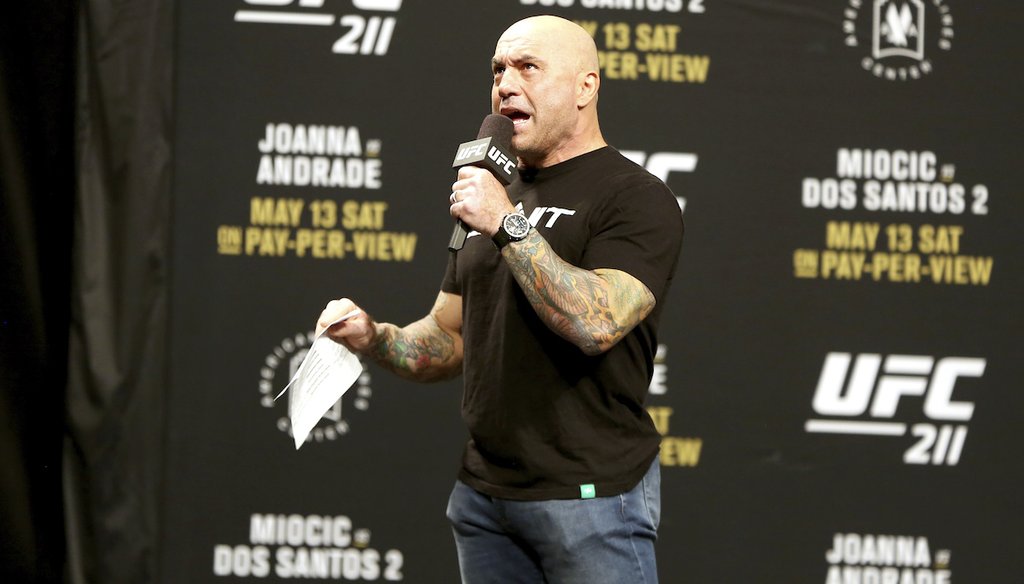Stand up for the facts!
Our only agenda is to publish the truth so you can be an informed participant in democracy.
We need your help.
I would like to contribute

Joe Rogan is seen during a weigh-in before UFC 211 on May 12, 2017, in Dallas before UFC 211. ( AP/Payan)
If Your Time is short
-
Even young, healthy people can get seriously ill or die from COVID-19, although their chances of suffering severe outcomes are smaller relative to older adults. They can also spread the coronavirus to more vulnerable people if they don’t get vaccinated.
Around a quarter of Americans in Generation Z have signaled in recent polls that they will not get a COVID-19 vaccine. And podcast host Joe Rogan told his millions of listeners that if they’re young and healthy, he doesn’t think they should.
Rogan, whose show "The Joe Rogan Experience" was the most popular podcast on Spotify in 2020, told comedian Dave Smith that he thinks vulnerable people should be vaccinated against the coronavirus, and that for the most part he thinks the shots are safe. (They are).
"But if you're like 21 years old, and you say to me, ‘Should I get vaccinated?’ I'll go, ‘No. Are you healthy? Are you a healthy person?’" Rogan said. "Like, look, don't do anything stupid, but you should take care of yourself. If you're a healthy person, and you're exercising all the time, and you're young, and you’re eating well, I don't think you need to worry about this."
Eight public health experts who spoke with PolitiFact and Dr. Anthony Fauci, the nation’s top infectious disease expert, all disagreed with Rogan’s advice.
Fauci said Rogan was "incorrect" on NBC’s "Today." He said that young, healthy people should "absolutely" get their COVID-19 vaccines, citing the risk that skipping vaccines poses not only to those people, but also to more vulnerable populations with whom they cross paths.
Sign up for PolitiFact texts
Currently, the Pfizer-BioNTech vaccine is approved in the U.S. only for children ages 16 and older, while the Moderna and Johnson & Johnson vaccines are available to adults 18 and older.
Like Fauci, the eight other experts PolitiFact consulted disagreed with Rogan’s recommendation that healthy 21-year-olds don’t get vaccinated. They described three major reasons why.
Consider the health of the population, not just the individual
The 21-year-olds that Rogan described may have a relatively lower chance of severe illness and death from a COVID-19 infection, but they could still transmit it to others who are more likely to have a bad or fatal outcome.
"Vaccination reduces transmission," said John Grabenstein, associate director for scientific communications at the Immunization Action Coalition.
A growing body of evidence suggests that fully vaccinated people are less likely to become asymptomatic carriers of the virus and potentially less likely to pass it along to others, according to the Centers for Disease Control and Prevention.
"The vaccines prevent not just COVID symptoms, but also spreading. In preventing spreading, they’re also preventing generation and transmission of new variants," said Andrew Noymer, professor of population health and disease prevention at the University of California, Irvine.
Part of the reason why young, healthy people are crucial to slowing the spread is because their age group has accounted for a large share of infections.
"The 18- to 49-year-old group has the highest prevalence of COVID-19 (in California)," said Richard Watanabe, professor of preventive medicine at the University of Southern California. "So, in order to limit the spread of the disease, these groups should get vaccinated."
Brooke Nichols, assistant professor of global health at Boston University, said many more vulnerable people, who are susceptible to severe disease, have still not been vaccinated.
And some other people simply cannot be vaccinated for medical reasons, such as chemotherapy for cancer or treatments for other chronic diseases, said Paul A. Offit, chair of vaccinology at the University of Pennsylvania’s Perelman School of Medicine.
"They depend on those around them to protect them," he said.
The disease can affect young people
Another reason healthy experts said 21-year-olds should get vaccinated is because there’s no guarantee that they would experience only mild symptoms if they contracted COVID-19. People of all ages have caught the disease, gotten very sick and even died.
"Most of those severe cases are in older people, but there are grieving families of teens and 20-somethings who would tell Joe (Rogan) that he is very wrong," Grabenstein said.
William Schaffner, professor of preventive medicine at Vanderbilt University, said doctors are seeing more young adults hospitalized and receiving intensive care.
In Michigan, for example, more young people are being admitted to hospitals with COVID-19 than at any other point during the coronavirus pandemic, at least in part because of variants that are more contagious and more severe, the New York Times reported.
The younger age group also includes people with high-risk conditions such as diabetes, obesity and asthma. And Noymer said people tend to overestimate their physical fitness and health.
"While most of them will fare well, COVID-19 is not something anybody should want to contract, not only for the acute symptoms and disruption to your life, but also because there is a risk that persistent long-haul symptoms could occur," said Amesh Adalja, senior scholar at the Johns Hopkins University Center for Health Security.
"Youth is not invincible," added Schaffner. "True, they are less likely to become seriously ill from COVID, but some do get really sick. So, from pure self-interest, they should get vaccinated."
Later in his segment, Rogan minimized the risks posed to children by the virus and questioned whether they should be required to get vaccinated. Experts countered that while most children have mild or no symptoms, roughly 300 have died, as PolitiFact reported.
Some children have also experienced a rare but serious medical condition associated with their infections, said Offit. He said he was "rounding at the Childrens’ Hospital of Philadelphia on COVID-19 patients" as he spoke to PolitiFact.
A healthy lifestyle does not confer immunity
Finally, the experts disputed Rogan’s assertion that good health makes vaccination unnecessary. The disease has a clear track record of infecting previously healthy people.
"No matter how much they exercise, no matter how well they eat, and no matter how vigorous they think their immune response is, they are at risk of this virus," Offit said.
Mark Schleiss, professor of pediatrics at the University of Minnesota, agreed that a sensible diet and regular exercise do not confer COVID-19 immunity. "The history of humanity is replete with examples of fatal infections occurring in otherwise healthy young people," he said.
Schleiss added: "Mr. Rogan should acknowledge that his comments may well cost lives."
Our Sources
Media Matters for America, "Spotify’s Joe Rogan encourages "healthy" 21-year-olds not to get a coronavirus vaccine," April 27, 2021
Today on YouTube, "Dr. Fauci Reacts To Joe Rogan Saying Healthy Young People Shouldn’t Get Vaccinated | TODAY," April 28, 2021
CNN Newsroom on Twitter, April 28, 2021
The New York Times, "Michigan’s Covid Wards Are Filling Up With Younger Patients," April 26, 2021
U.S. Centers for Disease Control and Prevention, "Benefits of Getting a COVID-19 Vaccine," April 12, 2021
STAT, "In the Covid-19 vaccine push, no one is speaking Gen Z’s language," April 8, 2021
PolitiFact, "Tiffany misses mark with claim that young adults are not susceptible to coronavirus," April 8, 2021
PolitiFact, "What Ron Johnson gets wrong about the COVID-19 vaccines," April 23, 2021
Email interview with Brooke Nichols, assistant professor of global health at the Boston University School of Health, April 28, 2021
Email interview with Amesh Adalja, senior scholar at the Johns Hopkins University Center for Health Security, April 28, 2021
Email interview with John Grabenstein, associate director for scientific communications at the Immunization Action Coalition, April 28, 2021
Email interview with William Schaffner, professor of preventive medicine and infectious diseases at the Vanderbilt University School of Medicine, April 28, 2021
Email interview with Mark Schleiss, professor of pediatrics at the University of Minnesota Medical School, April 28, 2021
Email interview with Richard Watanabe, professor of preventive medicine and associate dean for health and population science programs at the University of Southern California’s Keck School of Medicine, April 28, 2021
Phone interview with Andrew Noymer, professor of population health and disease prevention at the University of California, Irvine, April 28, 2021
Phone interview with Paul A. Offit, director of the Vaccine Education Center at the Children’s Hospital of Philadelphia and chair of vaccinology at the University of Pennsylvania’s Perelman School of Medicine, April 28, 2021






























